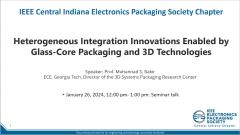2011 IEEE Honors: IEEE Medal for Innovations in Healthcare Technology - Harrison H. Barrett
Considered one of the top imaging scientists in the world for his knowledge of the underlying physics and mathematics of bio- medical imaging, Harrison H. Barrett has broadly impacted the field with contributions to instrumentation, reconstruction algo- rithms and image quality assessment. He has provided a rigorous theoretical basis and clearly defined experimental and computa- tional paradigms for the assessment and optimization of image quality. His work led to improved understanding of single photon emission computed tomography (SPECT) imaging, which uses gamma rays to provide three-dimensional imaging of the brain, tumors and bone. Dr. Barrett's research on image quality assessment has revolutionized how medical imaging systems are evaluated. He implemented numerical observers that allow a computer to analyze images instead of using human observers, overcoming what can be a lengthy process. Quantitative image quality assessment is now a requirement for practically all biomedical imaging. As early as 1972, he published some of the first results on using coded apertures for high-reso- lution tomographic imaging in nuclear medicine. During the 1980s and 1990s, he developed methods to improve the resolu- tion-sensitivity trade-off in SPECT systems. He developed a stationary hemispherical SPECT system for human brain imaging and the FastSPECT and FastSPECT II systems for fast dynamic imaging in small animals. Recent developments include semi- conductor arrays for high-resolution gamma-ray imaging. He co-founded the University of Arizona Center for Gamma-Ray Imaging in 1998. An IEEE Fellow, Dr. Barrett is currently Regents Professor and director of the Center for Gamma-Ray Imaging at the University of Arizona, Tucson.
Harrison H. Barrett receives the IEEE Medal for Innovations in Healthcare Technology for pioneering contributions to the foundations and applications of biomedical imaging science
 Cart
Cart Create Account
Create Account Sign In
Sign In





